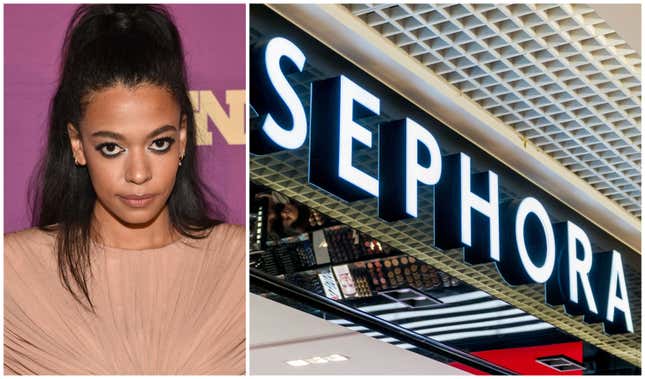
Here’s to black boxes that aren’t performative: beauty emporium Sephora has become the first to accept the #15PercentPledge proposed by designer Aurora James (Brother Vellies), committing to devote 15 percent of its shelf space to black-owned products.
“What a difference a week makes,” James wrote on Instagram. “A little over a week ago, I wrote an Instagram post and called on four of the biggest retailers in America to commit to a #15PercentPledge. That idea quickly became a movement and [an] entire organization. And now today, we are thrilled to announce that, of the four businesses we named, Sephora is the first to take the Pledge. With unparalleled influence and power, not only in the beauty industry but in retail at large, Sephora is making a historic contribution to the fight against systemic racism, economic inequality and discrimination by taking this Pledge. We commend their early leadership and look forward to working with them on their accountability and commitment as we join together in the mission to put billions back into the black community.”
Speaking with Vogue, James explained why Sephora was one of several major retailers—including Target and Whole Foods—that she specifically called upon when her challenge launched on June 1. “Sephora is such a huge company, has so many stores, and is such a major touchpoint for so many women—and I also know how innovative they are,” James said, later adding. “Sephora is such a huge business and their willingness to jump on board and do this in such a meaningful, holistic way really strips away the excuses that a lot of other retailers might have...They are also committing to really sharing their strategies, methods, and goals publicly, so that will also lay a great roadmap for other companies to be able to follow.”
For those underwhelmed by the idea of 15 percent, the number is intended to reflect the percentage of black people in the United States (which the Census actually estimates as just above 13 percent). For a company like Sephora, which sources beauty from all over the world but currently only stocks a handful of black-owned brands (Fenty Beauty, Pat McGrath Labs and Briogeo among them), to make a deliberate effort to make their offerings reflect the demographics of the country is a reasonable request for representation. And while the development will make it easier for those of us who prefer to #BuyBlack to do so when stopping by a Sephora, it’s also worth shouting out the black-owned marketplaces who’ve long been doing the work of promoting almost exclusively black beauty brands, like Marjani Beauty and Blk + Grn.
The response has already been overwhelming, as black beauty brands have responded en masse to Sephora’s online announcements, in hopes of being considered for coveted shelf space. Sephora has yet to reveal exactly how they’ll be identifying potential brands, but in a statement emailed to Vogue, Artemis Patrick, Sephora’s executive vice president and chief marketing officer said:
We were inspired to make the 15% Pledge because we believe it’s the right thing to do, for our clients, our industry and for our community. Ultimately, this commitment is about more than the prestige products on our shelves. It starts with a long-term plan diversifying our supply chain and building a system that creates a better platform for black-owned brands to grow, while ensuring black voices help shape our industry. We recognize we can do better and this pledge builds on our ongoing work to use our resources to drive meaningful and long-term change for Sephora and our industry.
Long-term change—as opposed to one-time statements and donations—is James’ goal, as she told Vogue. “Part of why I created the 15% Pledge as an organization after I announced it as an idea was so that we could continue to stick around and actually hold them accountable and work with them in getting over the hiccups and the hangups that could come along the way...I think that’s the difference between these donation requests versus the 15% Pledge,” she said, calling out some of the more performative, but ultimately temporary measures taken by some of the other large companies she’s asked to participate.
James, whose Brother Vellies brand is a favorite among fashion insiders, is well-practiced in inclusion. Her brand helps sustain artisan culture around the world. As a black woman coping with current events like the rest of us, she admits starting this new initiative while helming a business has been “a strain,” both emotionally and professionally. Nevertheless, James is committed to this new cause, onboarding other industry leaders to assist her and also putting fashion retailers in her sights.
“I’m not going to stop,” she told Vogue. “This is really about standing up for economic equality and racial justice. People are like, ‘Well, it’s a lot of work.’ You know what? Black people in America have been working really hard for a really long time. I don’t think that’s an excuse. The time to act is now and I think that we are always going to remember the companies that stood with us and those that chose to stand silent in this moment because their silence is deafening.”

